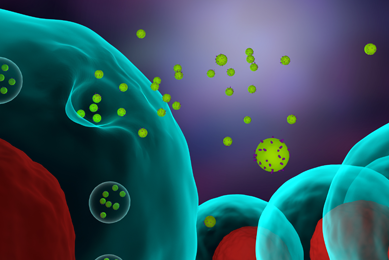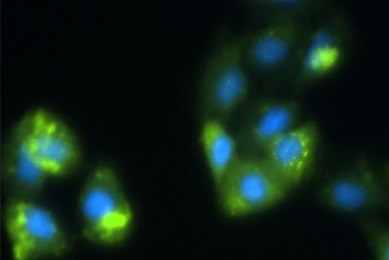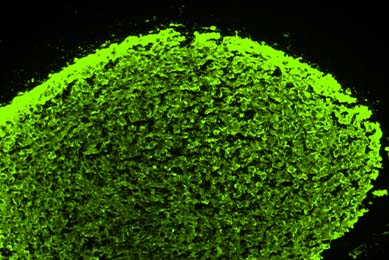Why it's important
Exosomes are nano-sized vesicles that are released by all cell types and they encapsulate a wide range of biological cargo—including nucleic acids (DNA and RNA), proteins, cytokines, and lipids—that is representative of their originating cells. In recent years, exosomes have been recognized as critical mediators of intercellular communication as they have the potential to exert significant effects on various signal transduction pathways. In addition to their roles in intercellular communication, exosomes also have high potential to be used as diagnostic tools and/or therapeutic agents in a wide range of pathological conditions. Along these lines, a recent report from BCC Research projects that the global exosome market will surpass $500 million by 2026; however, there is currently a gap in the market due to the lack of well-characterized exosome standards.1 This rising interest underlies a significant need for the isolation and concentration of high-quality exosomes from large-scale batches. While traditional methods such as ultracentrifugation are suitable for small-scale studies, the development of scalable and robust processes is essential to meet the growing needs of the scientific community.
How can we help?
The scientific community is in need of high-quality exosome reference materials to better regulate and support exosome-based research. As a global leader in the development, production, and distribution of biological material, ATCC provides scientists with access to credible reagents needed to support exosome/EV-based research. ATCC has well-established, reproducible, and robust processes for the concentration and characterization of functional exosomes that demonstrates minimal lot-to-lot variability.2,3 Our current portfolio includes exosomes isolated from our top-selling, well-characterized, and quality-controlled cell lines representing various cancer types. We also offer a novel exosome product isolated from an hTERT-immortalized mesenchymal stem cell line (Table 1, 2). These exosome products are high purity are ready for use in various cell-based or molecular assays.
Table 1. ATCC exosome portfolio
| ATCC No. | Parental Cell Designation | Cancer Model |
|---|---|---|
| SCRC-4000-EXM | hTERT-immortalized adipose-derived mesenchymal stem cell (MSC) | N/A |
| CCL-185-EXM | A549 | Carcinoma, lung |
| CRL-1435-EXM | PC-3 | Adenocarcinoma, prostate |
| CCL-247-EXM | HCT 116 | Carcinoma, colorectal |
| CRL-1740-EXM | LNCaP | Carcinoma, prostate |
Table 2. Specifications of ATCC exosomes
| Attribute | Test | Specification |
|---|---|---|
| Protein concentration/vial | BCA | Report results |
| Particle number/vial | NTA | ≥109 particles |
| Size distribution (% particles within 50-200 nm) | NTA | ≥70% |
| Protein marker expression | Western Blot | Positive expression of 1 transmembrane protein and 1 cytosolic protein |
| Sterility |
iAST bottle (aerobic) at 32.5°C iNST bottle (anaerobic) at 32.5°C |
No growth detected |
| Mycoplasma | PCR based assay | Negative |
Did you know?
There are over 20 clinical trials investigating the therapeutic potential of stem cell exosomes against various diseases, including COVID-19.
Heather Branscome, PhD
Senior Scientist, ATCC
Dr. Heather Branscome is a Senior Scientist with ATCC. Throughout her 17-year career she has gained broad experience working in both academic and industry settings. She has extensive experience in cell and molecular biology and completed her graduate training in Biosciences from George Mason University. While at ATCC she has held positions in manufacturing, quality control, and technology transfer to support the production and qualification of cell lines and other critical biological reagents to support the scientific community. In her current role she manages a team of biologists to support the CDC’s International Reagent Resources (IRR) program, as well as other government contracts. Since 2018, she has played a key role in establishing and maintaining ATCC’s extracellular vesicle (EV) portfolio. In this role she was responsible for developing and validating large-scale EV manufacturing protocols and performing various EV biochemical and functional assays. Her current research is focused on advanced methods for EV purification, characterization of novel EV subtypes, and mechanistic studies of stem cell-derived EVs in different models of cellular repair. She currently serves as director and instructor for two local Bio-Trac® biotechnology training programs and maintains an active affiliation with George Mason University.
Steven Budd, MS, MBA
Product Specialist, ATCC
Steven Budd is a Product Specialist that manages the cell culture reagents at ATCC. He has 6 years of experience in the product management of scientific tools. Before that, he gained 4 years of experience in biomedical research and cell culture as a research specialist at the University of North Carolina at Chapel Hill. Mr. Budd has a M.S. in Biology from the University of North Carolina at Wilmington and an M.B.A. from North Carolina State University.
Explore our resources for exosomes
 Presentation
Presentation
Large-scale Manufacturing and Functional Assessment of Extracellular Vesicles
This is a talk presented at the American Exosome and RNA Conference that demonstrates a method for the isolation of high-quality EVs from large-scale batches.
More Webinar
Webinar
On the Edge of the Bubble: Use of Exosomes as Reference Materials in Biomedical Research
Watch this webinar to hear an overview of exosomes from various well-characterized ATCC cell lines and data indicating that these extracellular vesicles can be used as reference materials in biological research and assay development.
More Podcast
Podcast
Episode 6: The Future of Extracellular Vesicle Research in Therapeutic and Diagnostic Development
Listen in to learn about some of the hurdles that restrain the development of EV research and how synergistic collaborations between academia and ATCC can help us leap towards the future.
MoreReferences
- BCC Research. Exosome Diagnostics and Therapeutics: Global Markets. <https://www.bccresearch.com/market-research/biotechnology/exosome-diagnostics-and-therapeutics-global-markets-report.html#Report%20Highlights>
- Branscome H, et al. Use of Stem Cell Extracellular Vesicles as a "Holistic" Approach to CNS Repair. Front Cell Dev Biol 8: 455, 2020. PubMed: 32587858
- Branscome H, et al. Retroviral infection of human neurospheres and use of stem Cell EVs to repair cellular damage. 12(1): 2019, 2022. PubMed: 35132117